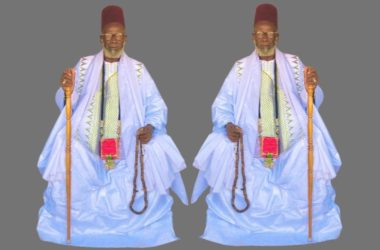Fourth Lesson: Honour for a Muslim
 (JollofNews) – The gist of this lesson is that every Muslim should realise the rights of other Muslims, and should observe them practically, according to the order of the classes and ranks of his brethren in Islam.
(JollofNews) – The gist of this lesson is that every Muslim should realise the rights of other Muslims, and should observe them practically, according to the order of the classes and ranks of his brethren in Islam.
Particularly, he should have great regard for the honour of a Muslim, who deserves reverence by all means, for he has the light of faith in his heart. Rasulullah (SAW) says in a hadith, “He is not one of us, who does not respect our elders, and does not show mercy to our youngsters and is not respectful to our scholars”. Another hadith says, “Only a hypocrite could insult these three person; first, an aged Muslim; second, a religious scholar; third, a Muslim king, who observes justice”.
According to the teaching of the Holy Qur’an, and hadith, here are the most important qualities of a true believer. He should realise the rights of Allah’s creatures, and should be polite and humble to them. He should like for others, what he likes for himself. He should not be envious of others, nor should he have malice about them. He must not be proud. He should be courteous and loving to all. He should be the first to greet a Muslim. He should be generous enough to pardon those who have offended him. He should go to visit the sick. He should respect all just as he respects himself. He should avoid back-biting. He should overlook the weaknesses of others. If anyone consults him, he should give him the right and honest counsel. He should give financial help to the poor and the needy. He should not rejoice in the misery of others. And the most distinguished and valuable service to a Muslim is that he should be instructed with a firm faith in Allah, in the Day of Judgement, and to be prepared for it with a lot of good deeds, so that he should be delivered of the chastisement thereon. Undoubtedly, this is the best service to a brother in Islam.
Islam has instructed all the Muslims with a collective life, and has enjoined unity to them, that they should provide peace and prosperity for one another. For instance, they have been instructed to put on their best clothes, and apply perfume to them for the Jumu’ah and the Eid prayers; they have been prevented from jumping over the necks of the worshippers, or to sit between two persons without their permission, or to remove anyone from his sitting place.
Rasulullah (SAW) says, “A true Muslim is he, who does not offend any other Muslim with his tongue or hand; and a true believer is he, who does not cause any loss to another believer”. In another hadith Rasulullah (SAW) says, “That person will not enter Jannah, whose neighbor is not safe from his offence”.
These sayings of Rasulullah (SAW) clearly indicate that a believer should behaves so courteously towards others, that they should never fear trouble or a loss from his quarters.
In another hadith Rasulullah (SAW) clearly indicate that a believer should behave so courteously towards others, that they should never fear trouble or a loss from his quarters.
In another hadith Rasulullah (SAW) says, “Whoever helps a poor and miserable person, Allah will grant him sufficient to put his affairs aright in this world, and the other 72 rewards will sublimate his ranks in the life hereafter”.
Another hadith says, “When a Muslim leaves his home to see another Muslim seventy thousand angels see him off, and all of them bless him with the mercy of Allah”. Rasulullah (SAW) says about a co-traveller, “Only that person is your chief in a journey, who serves his companions best; no one can supersede such a person, except a martyr”.
Fifth Lesson
Sincerity of Intention
This is also called the “correction of intention”. That is, whenever a person intends to do something good, he must not be tempted by some worldly interest, but should do it purely for the pleasure of Allah, and to have its reward in the life hereafter.
This purity of intention can be achieved only when he has a firm faith in the reward which Allah and Rasulullah (SAW) have promised for our good deeds, and, therefore, the hope of this reward should be our motive in good deeds. That is why Rasulullah (SAW) has said, “The reward for your deeds depends entirely on your intention, and everyone is paid in accordance with the nature or his intention”; it means, that it is not merely the action which ensures a reward from Allah, but it is the sincerity of our intention, which will ensure it. If an action is void of good intention, and is undertaken for the sake of passion, or to please men, or to attain some worldly interest, then it is hollow, lifeless and deserves no reward from Allah. A hadith to this effect says, “All the deeds of men will be gathered together before Allah, on the Day of Qiyaamah; of them only the deeds which are purely done for Allah, will be separated, and the rest will be thrown into hell”.
When certain good deeds are done purely for Allah, it is called “Ikhlaas” and whenever a believer intends to do something based on sincerity, the evil self, or the Shaytaan cause hindrances in his way. Therefore it is indispensable to sincerity that one should forsake the worldly temptations, and should believe in the everlasting boons and favour of the life hereafter.
Those who have realised the value of sincerity, they apply it to their worldly affairs also. They observe the sincerity of intention in eating, drinking, sleeping, awaking, walking, earning their living etc., but this standard of sincerity cannot be achieved without the company of saints and devouts. As an example, our religious scholars have told us that by observing fasts, if someone desires its reward and good health at the same time; or, if by undertaking a pilgrimage, one wishes reward, recreation, and safety from the enemy; or, if by giving alms to a beggar, one has an intention to have its reward from Allah, appreciation from the onlookers, and to silence the beggar, then all the above-mentioned deeds will be void of sincerity.
A companion of Rasulullah (SAW) asked him, “What is faith?” He replied, “Another name for faith is sincerity!” In another hadith Rasulullah (SAW) says, “Observe sincerity in your deeds, then even a few good deeds will have the reward of great virtue for you!” Another companion of Rasulullah (SAW) asked him, “One man participates in the holy war for the sake of riches, and another man participates in it for the sake of reputation, that he may be called a hero; say, O Messenger of Allah, who is fighting in the way of Allah?” He answered, “Only that person fights in the way of Allah, who wants to propagate and establish the truth told by Him (in the Holy Quran)”.
Those who do not desire the pleasure of Allah by their deeds, but wish only the worldly achievements, they are certainly hypocrites, and this (hypocrisy) is a disease of the heart, which our spiritualists say, is the root of all evils. Once Rasulullah (SAW) said to his companions. “The thing I fear most in your actions, is smaller polytheism”. His companions asked, “What is smaller polytheism”. He answered, “Show (of one’s good deeds!)”
Another hadith says, “Whoever made a show of his prayer, or fasting, or charity, he committed polytheism”. Another hadith says, “There is a pit of sorrow in Jahannam, of which Jahannam even seeks refuge, of Allah; those worshippers, who make a show of their worship, will be thrown into it”.
To be continued





